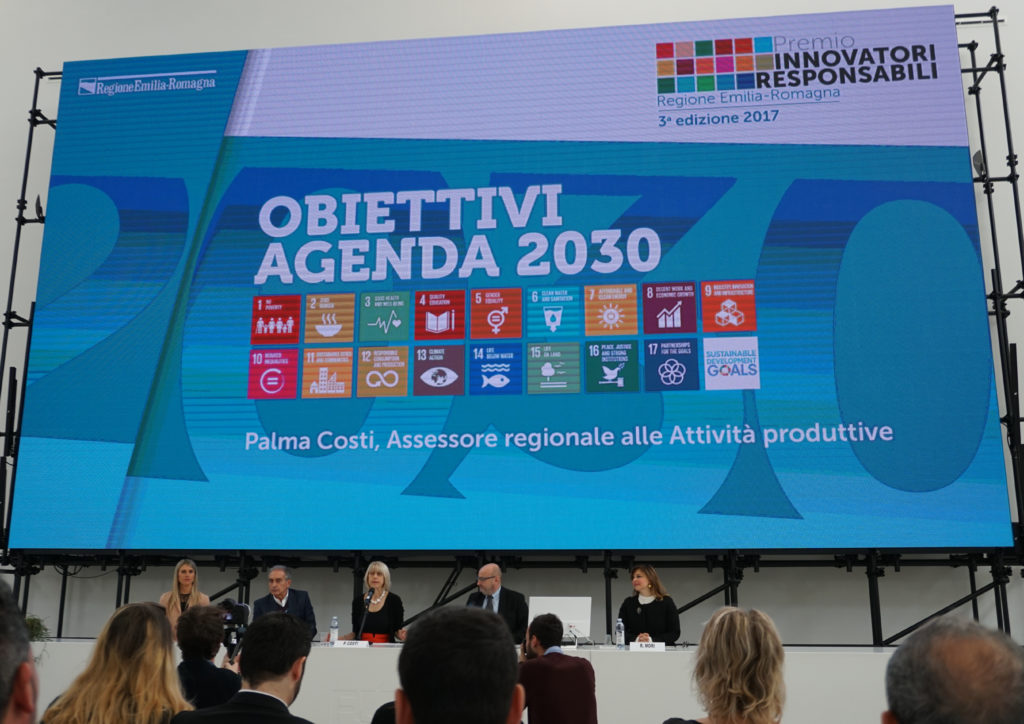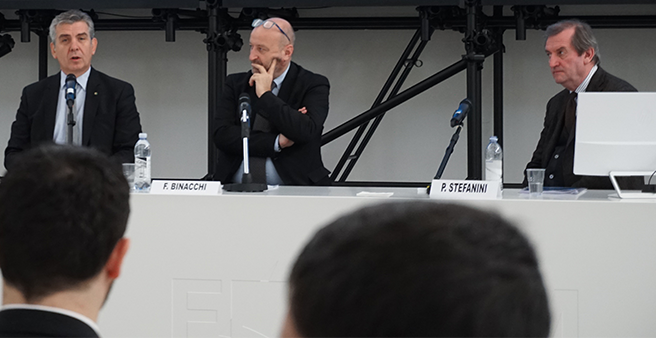 Awareness and new visions of the territory by Sara Cirone.
Awareness and new visions of the territory by Sara Cirone.
Wednesday 6th December 2017. The ceremony of the “The business organizations of Emilia-Romagna for the Goals of the 2030 UN Agenda” Responsible Innovators Awards was held at Florim Gallery in Fiorano Modenese.
The Corporate Social Responsibility and its practices have been the key-themes of the event. Many people affirmed clearly and emphasized the necessity of a new economic perspective where business organizations can be the subjects to practice a corporate the social responsibility addressed to a humanistic sensitiveness, strongly related with both people and their territory.
For this very reason, this article reports the most significant and constructive contributions to the event. Public figures of the Emilia-Romagna Region, business organizations and ASviS held these interventions, with a view to stimulate more and more a debate, whose values are shared and where all the subjects offer their own contribution starting off from a common view.
Fabrizio Binacchi, Regional Director of RAI Emilia-Romagna , Claudio Lucchese, Florim Ceramiche President, Palma Costi, Assessor to Productive Activities, energetic plan, green economy and post-seismic reconstruction, Roberta Mori, President of the Regional Commission for Equality and Citizens’ Rights, introduced the meeting.
Pierluigi Stefanini, Unipol Gruppo President, President of ASviS – Italian Alliance for the Sustainable Development, Andrea Pontremoli, Dallara Automobili AD, Muner-Motervehicle University of Emilia-Romagna Association President, intervened at the event.

Palma Costi, Assessor to the productive activities, energetic plan, green economy and post-seismic reconstruction, speaks of our local territory: Emilia-Romagna. Our region has accepted the challenge to reach the 2030 UN Agenda goals. Our territory can live up to this challenge because its roots are endowed with a culture and an entrepreneurial system of great capabilities and vision. In fact, the most part of the business organizations that have accepted this challenge have a vision of the future with a real possibility to express of a positive lifestyle: a lifestyle at the centre of which a new way of thinking and a new model of humanism – the well-being of people, environment, community and territory – are placed. Today this model is highly innovative.
We all live in an epoch where science and philosophy motivate every person to a self-enhancement and to the pursuit new competences: the person is at the centre of work according to this evaluation of human competences. Work has finally ceased to be an abstract concept and has now become concrete. Work is the everyday people’s living condition in their workplaces: for this very reason, people sitting in the palaces of power should begin to observe such everyday realities. Furthermore, some still unseen aspects of the existing reality should emerge: more experience exist than we actually can see.
The Corporate Social Responsibility Awards were conferred to the winners: the Responsible Innovators. The future objective will be the creation of a whole network of Responsible Innovators adhering to a vision of sustainable responsibility and with the capability to add a far-fetched vision and strong competitiveness to the business organizations, for a future with a high added value.
Roberta Mori, President of the Regional Equality Commission, explained that Emilia-Romagna is the sole Region to have an Equality Commission. This commission expresses a precise political and institutional vision and a radical and structural choice. The elimination of inequalities is necessary to reach the objective of a widespread well-being. This is the reason why the theme of women is innovative and the capability of business organizations to adhere to this sensitiveness has been awarded for its merit to the respect of diversities.
 Pierluigi Stefanini, President of Unipol Gruppo and President of ASviS – Italian Alliance for Sustainable Development, specifies that in 2015, with the definition of the UN Global Agenda, the shared awareness of the impossibility to keep following the contemporary economic model of development had already become clear. This awareness is now widespread and should fully involve all the components of our society. Today with the participation of every one of us, we should and could communicate this awareness of the possibility of a change. First of all, by our commitment in reaching the goals of the 2030 UN Agenda, and adopting its policies: in the first instance, Europe can use its welfare as a global competitive instrument. Culture should become a behaviour: for this reason, ASviS is growing and its intention is to contribute to the development of sustainable culture. For our country, this means a strategic opportunity and the pursuit of the SDGs.
Pierluigi Stefanini, President of Unipol Gruppo and President of ASviS – Italian Alliance for Sustainable Development, specifies that in 2015, with the definition of the UN Global Agenda, the shared awareness of the impossibility to keep following the contemporary economic model of development had already become clear. This awareness is now widespread and should fully involve all the components of our society. Today with the participation of every one of us, we should and could communicate this awareness of the possibility of a change. First of all, by our commitment in reaching the goals of the 2030 UN Agenda, and adopting its policies: in the first instance, Europe can use its welfare as a global competitive instrument. Culture should become a behaviour: for this reason, ASviS is growing and its intention is to contribute to the development of sustainable culture. For our country, this means a strategic opportunity and the pursuit of the SDGs.
Andrea Pontremoli, AD of Dallara Automobili, President of the Association Muner-Motervehicle University of Emilia-Romagna, pointed out that our baseline definition of Corporate Social Responsibility is founded on the tradition of our territory and not of the USA. Today we are aware of the primary importance of people: in the world of business organizations, not only innovative technologies, but also innovative people are required. Therefore, in the Corporate Social Responsibility practices, human resources marks the difference and not the economic resources: but not only that. In fact today, in a global world, business organizations are competitive when they are in relation with their local contexts. Local contexts represent the place where people and time are in action: they are all competitive and necessary elements for the future business organization.
In conclusion
Something is changing. The perception of the local contexts of business organizations, their people, their relations with the environment and their community are all changing elements. We can see this change from many situations and hear it from many voices. This radical change leads us to a new widespread and shared awareness. Therefore, a new humanistic management is emerging in the reflections and practices of many subjects of the economic and institutional worlds. We participate in and give voice to this new vision. These are the first steps towards this change that is both a symptom and a symbol of a new step in the evolution of civilization.